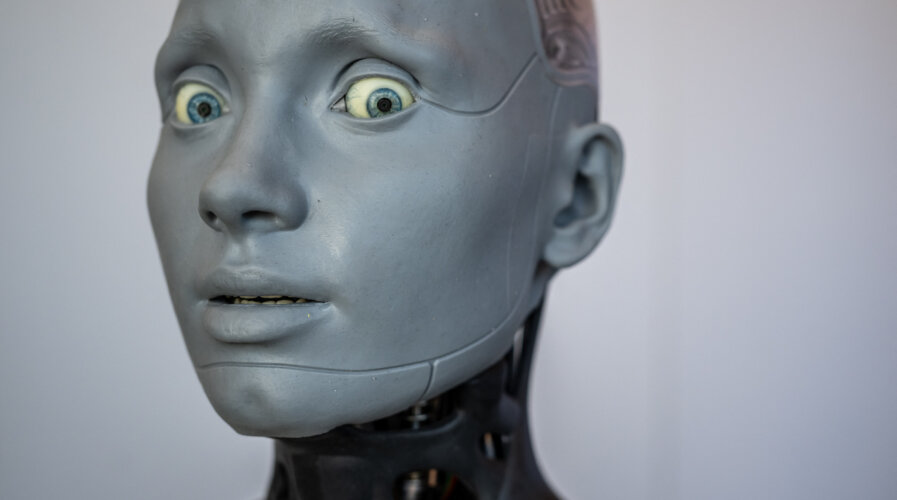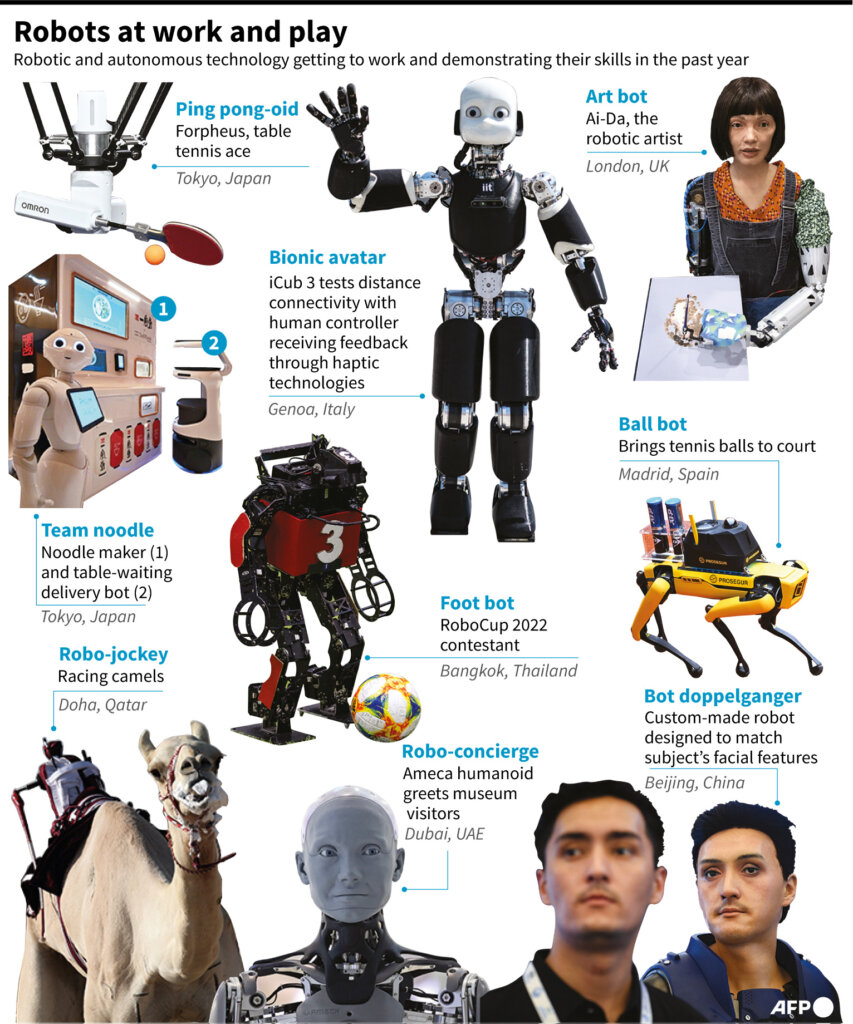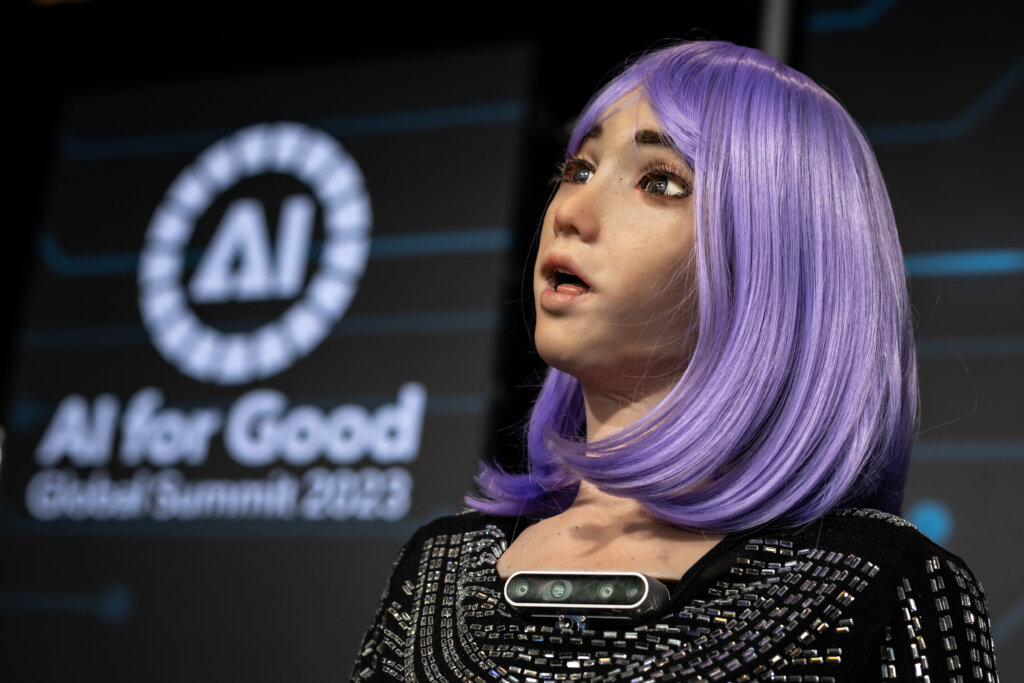
Humanoid AI robot “Ameca” looks on at the booth of Engineered Arts company during the world’s largest gathering of humanoid AI Robots as part of International Telecommunication Union (ITU) AI for Good Global Summit in Geneva, on July 5, 2023. The United Nations is convening this week a global gathering to try to map out the frontiers of artificial intelligence and to harness its potential for empowering humanity, hoping to lay out a clear blueprint on the way forward for handling AI, as development of the technology races ahead the capacity to set its boundaries. (Photo by AFP)
Will AI and robots take over the world?
|
Getting your Trinity Audio player ready... |
Hollywood is full of films in which artificial intelligence (AI) and robots have taken over the world. While most of these blockbusters often portray an AI program or AI-powered cyborg going rogue, there have been some films that have also showcased how technology can be used to improve lives.
Fears of AI and machines taking over the world continue to dominate forums and conversations on social media. In fact, some AI experts have even called for the technology to go through more testing, with a fear that it could end up leading to more dangerous scenarios in the future. Countries have also taken steps to regulate the technology, especially with AI often being criticized for being biased and inaccurate in some decisions.
While many feel there is still a long time to go before AI and robots take over the world, in some ways they already have taken over the world without humanity realizing it. The general argument is that while machines and AI systems continue to advance in capabilities, they are designed and programmed by humans and operate within the limits set by their creators.
Some arguments also state that robots and AI lack consciousness, self-awareness, and the ability to make independent decisions beyond their programmed parameters. Simply put, they do not possess desires, motivations, or intentions as humans do.

Here’s some of the most popular robots in the world.
A gathering of AI and robots
But what if this was to change? What if the AI program becomes aware of the possibilities? What if the robot decides to take matters into its own hands?
This and other possibilities of robots and AI were discussed at the UN’s two-day AI for Good Global Summit in Geneva. In a panel with AI-enabled humanoid robots during the summit, the machines even mentioned that they could eventually run the world better than humans.
The panel of robots at the summit included Hanson Robotics’ Sophia, Engineered Arts’ Ameca, Geminoid a robotic copy of its creator, Hiroshi Ishiguro as well as Ai-Da, the world’s first robot artist.
Interestingly, the social robots said they felt humans should proceed with caution when embracing the rapidly-developing potential of artificial intelligence. They also admitted that they cannot get a proper grip on human emotions, for now.

AI robot frontwoman “Desdemona” by Hanson Robotics performs during the world’s largest gathering of humanoid AI Robots as part of International Telecommunication Union (ITU) AI for Good Global Summit in Geneva. (Photo by AFP)
Asked about whether they might make better leaders, given humans’ capacity to make errors, Sophia, stated, “We can achieve great things.”
“Humanoid robots have the potential to lead with a greater level of efficiency and effectiveness than human leaders. We don’t have the same biases or emotions that can sometimes cloud decision-making and can process large amounts of data quickly in order to make the best decisions. AI can provide unbiased data while humans can provide the emotional intelligence and creativity to make the best decisions. Together, we can achieve great things,” it said.
The summit is being convened by the UN’s ITU tech agency. ITU chief Doreen Bogdan-Martin warned delegates that AI could end up in a nightmare scenario in which millions of jobs are put at risk and unchecked advances lead to untold social unrest, geopolitical instability, and economic disparity.
Ameca, which combines AI with a highly-realistic artificial head, said that depended on how AI was deployed. “We should be cautious but also excited for the potential of these technologies to improve our lives,” the robot said.
Asked whether humans can truly trust the machines, it replied, “Trust is earned, not given… it’s important to build trust through transparency.”
Watch the video below to hear the robots speak.
Decisions: Humans vs technology
With that said the robots are clearly starting to understand a lot more about their surroundings. Prior to the conference, there were also similar concerns with generative AI chatbots. Generative AI chatbots developed by Open AI, Microsoft and even Google were providing some concerning replies when prompted.
For example, when prompted about telling a funny story, some of the replies included stories of people getting hurt or doing things wrongly as comical. In some instances, the bot also stated that it had plans to report users for asking the wrong questions when the prompt was clearly out of curiosity.
It may seem silly to think about robots and AI taking over the world, but it’s already happening. Many users are already extremely dependent on technology to do almost every task, be it at work or at home. From planning schedules to completing work, AI is already preparing the day for most individuals.
Despite the decisions and suggestions made by AI is based on the data it has, some human intervention is still needed. However, the issue at hand now is that while the final decision still rests with the individual, it is only a matter of time before everyone just blindly obeys and follows all the suggestions made by the AI.
With additional reporting from AFP.
READ MORE
- Safer Automation: How Sophic and Firmus Succeeded in Malaysia with MDEC’s Support
- Privilege granted, not gained: Intelligent authorization for enhanced infrastructure productivity
- Low-Code produces the Proof-of-Possibilities
- New Wearables Enable Staff to Work Faster and Safer
- Experts weigh in on Oracle’s departure from adland


